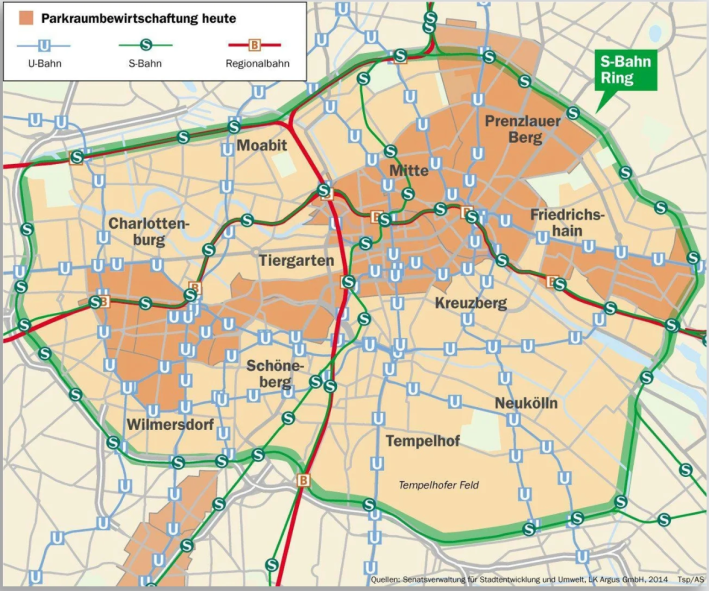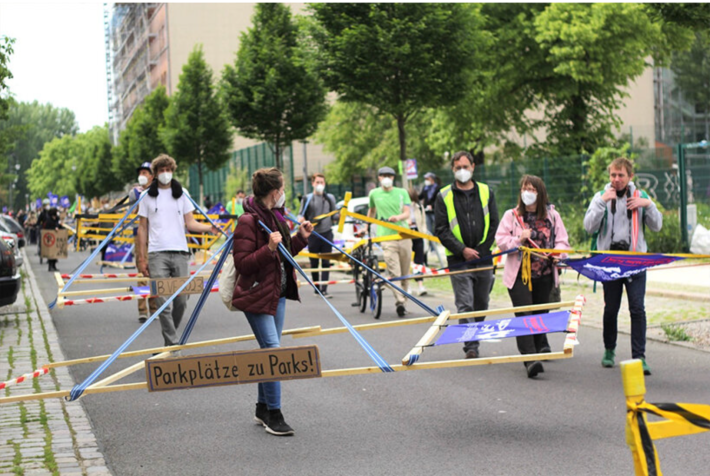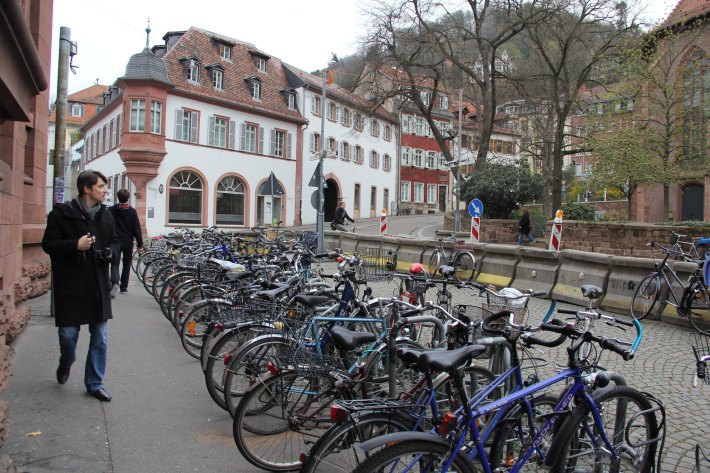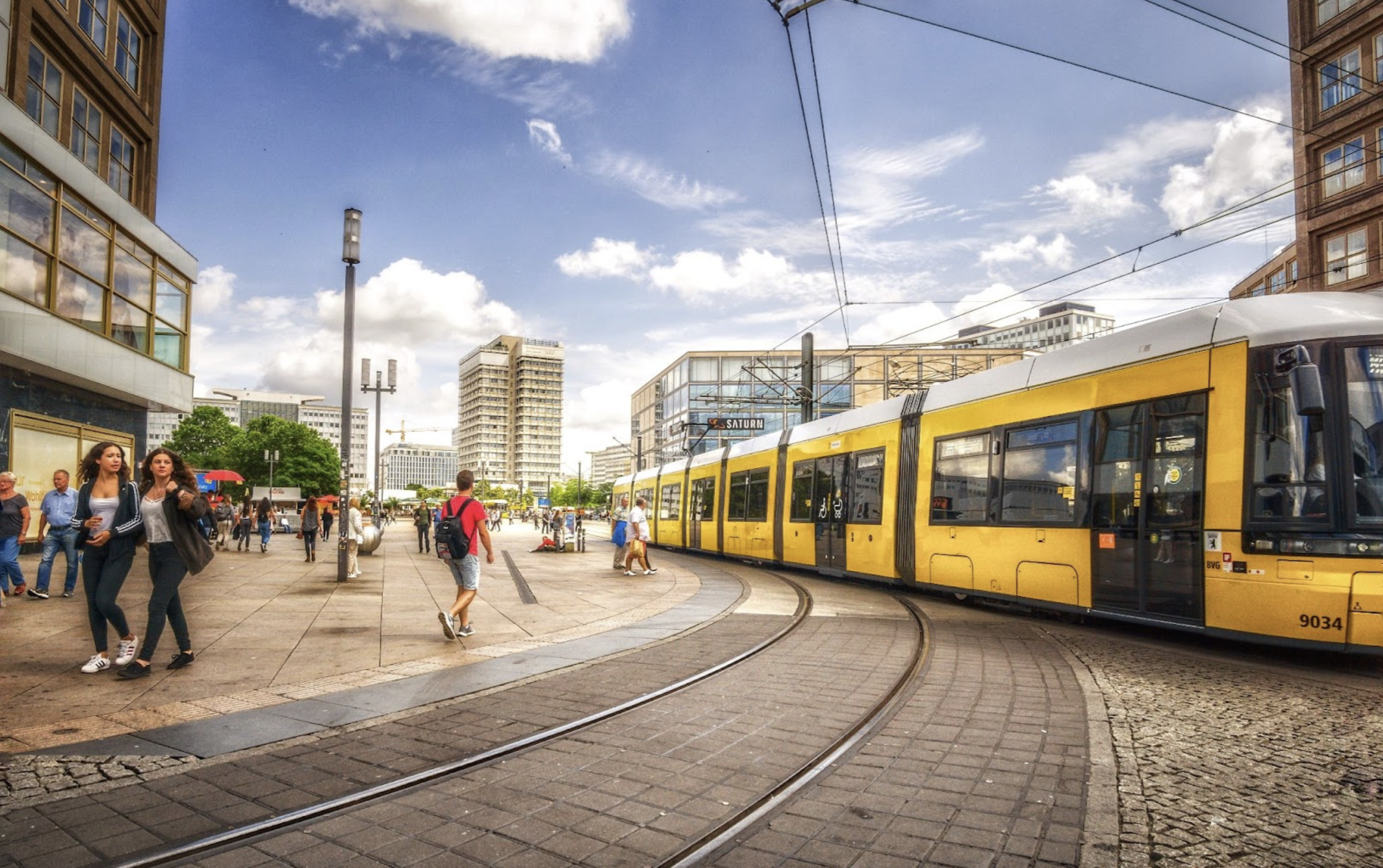Berlin-based advocates are one step closer to creating a car-free zone in their city that's bigger than the entirety of Manhattan.
A decision on Wednesday by the Berlin Constitutional Court allows a long-stalled initiative by the advocacy group Volksentscheid Berlin Autofrei ("Ballot Measure for an Auto-Free Berlin) to continue gathering signatures for a referendum to create a zone in the center of the German capital that would be free of almost all private automobiles.
Since 2020, the group has been advocating to reimagine an area bounded by the city's 22-mile ring railroad, the Ringbahn, which is served by some of the best transit connections in the country. The total amount of ground covered by the ban would be larger than the land footprint of Manhattan, the central borough of New York City that hosts 25 subway lines. (By comparison, Berlin's U-Bahn system comprises nine lines, though the area also has some additional service from trams and S-Bahn trains.)
The group's efforts had already reached the initial, 50,000-signature threshold before a series of procedural impediments threw a wrench in their effort. Wednesday's court decision pushes the long-delayed process forward, beginning with a debate at the Berlin House of Representatives, followed by another round of signature collection that would allow the referendum to take place in 2026, the group said.

The "ban" would still allow up to 12 uses of a private automobile per year per person. It would also include exceptions for rental vehicles, people with disabilities, and service vehicles like delivery vans and garbage trucks.
Nonetheless, pro-car voices within Berlin's state-level legislative body, the Senate of Berlin, have joined with related lobbying entities to oppose the proposal. Transport Senator Ute Bonde, a member of the Christian Democrats, admitted to Tagesspiegel that the auto ban might be constitutionally permissible, its negative consequences are "in my opinion ... certainly not sensible or reasonable."
The Berlin Senate had been responsible for the latest delay in the ballot measure process, deeming the goal "unconstitutional and disproportionate," according to Tagesspiegel. The setback delayed action toward a ballot measure for three years.
But can they win?
Germany, a country with a large and storied auto industry, has high levels of motor vehicle ownership relative to most countries: 574 vehicles per 1,000 residents, according to Yes Magazine. (The United States has about 850.) Berlin, however, has a much lower level of auto use, thanks largely to a public transit system that Time Out ranked as the best in the world in 2023 (albeit controversially, since the ranking was based on a reader poll rather than more quantitative metrics).
And Berliners also are known for making unorthodox voting choices, which could yield good results if the ban makes it to the ballot. In 2021, Berliners approved a ballot question asking that the state buy thousands of apartments managed by large landlords — a measure few thought would succeed.
The group pushing for the automotive restrictions is touting the court decision as a win over a benighted and out-of-touch Senate leadership.
"Metropolises around the world have long been competing to make their streets more livable — from Paris to Bogotá, people are reclaiming public space," said Benni Wasmer, spokesperson for the initiative, in a press release. "But the [Berlin Senate has been] setting Berlin back decades in its transport policy. Only our law makes Parisian conditions possible in Berlin — from a legal perspective."

Paris has recently climbed the ranks of walkable and bikeable cities, thanks to aggressive reforms led by Mayor Anne Hidalgo — leaving many Berliners feeling that their city is less livable compared to peer cities.
There are more urgent reasons for the ballot push as well. Thomas Howie, a member of Volksentscheid Berlin Autofrei, pointed out that banning non-essential vehicles will fight climate change — a concern for the nation's coastal regions as well as its inland zones.
“You can already observe the effects of the lowered water table [inland],” he told Yes Magazine. "Many trees are dying in our city.
“Of course, this might not seem that drastic in the short term; however, it is highly likely that water prices will climb significantly in the medium term. This will impact all of us,” he added. “More worryingly, extreme heating events, such as the 2003 heat wave, which killed thousands in Paris, will happen more often."
Pedestrianization has been a boon to many European cities, such as Groningen, where about 230,000 residents spend more time on bicycles than in cars, according to The Guardian — and now breathe some of the cleanest air of any Dutch city.
That city was divided into quadrants in the 1970s, forcing most motorized traffic to go around on a ring road in order to get from one quadrant to another. That made cycling the most attractive way to travel through the city's center.

Germany has had its own pedestrianization successes, too. The mayor of Heidelberg, Eckart Würzner, once told the The New York Times that if citizens need a car, they should “use car sharing."
"[And] if you can’t use car sharing because you’re living too far outside and there is no mass transportation, then use the car, but just to the train station and not to downtown," he added.
Closer to the banks of the Spree, however, advocates for pedestrianization have been less successful. A recent effort to pedestrianize a main shopping street in Berlin was reversed by a conservative-led court, and the construction of a new urban freeway — a rarity in a time when many European cities are ripping theirs out or even converting them to canals — is continuing unimpeded.
Predictably, business leaders oppose the car ban. The head of the League of Business Associations in Berlin and Brandenburg called it "a severe blow to the economy in the capital region," Tagesspiegel reported.
That unfounded assertion is somewhat at odds with recent research showing that in 14 Spanish cities, pedestrianization efforts increased business, rather than decreasing it.
The skepticism does not dissuade advocates.
"We have won across the board: Berlin's future belongs to the safety, climate protection, and health of all Berliners — and not to unrestrained car traffic," stated Marie Wagner, a spokesperson for the initiative. "Now we must get Berlin's transport policy out of reverse gear and finally move forward with the transport transition. We stand for a city that belongs to the people, in which we shape our neighborhoods ourselves, with vibrant streets and clean air."






